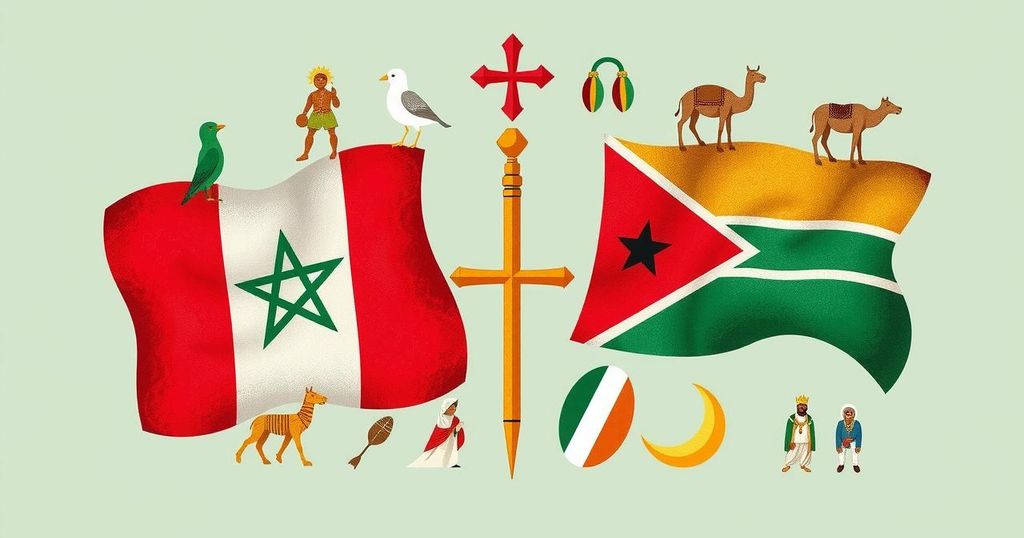Strategic Relations Between Morocco and Mauritania: A Path Forward

The strategic relations between Morocco and Mauritania are evolving, particularly regarding regional security and economic cooperation. Their partnership is characterized by historical ties, recent diplomatic engagements, and joint initiatives like the Atlantic Gas Pipeline. By addressing contemporary challenges through collaboration, both nations seek to enhance regional integration and stability while promoting mutual development opportunities.
The strategic relations between the Kingdom of Morocco and Mauritania have significantly evolved, particularly in light of the Western Sahara conflict. As Mauritania occupies a vital geographical position between Algeria and Morocco, it becomes pivotal in diplomatic endeavors aimed at resolving regional disputes. Recent advancements in relations were marked by King Mohammed VI’s welcoming of Mauritanian President Mohamed Ould Ghazouani. The bilateral relations underscore cultural, economic, and security collaboration that serves mutual interests while responding to the challenges posed by regional instability.
Historically, Moroccan-Mauritanian ties are built on the foundations of collective security and development. This relationship translates into collaborative actions that are essential for addressing security threats such as terrorism and human trafficking. Mauritania’s stance, while influenced by external pressure from Algeria, seeks to uphold neutrality in the Western Sahara matter while simultaneously fostering a conducive political and economic environment. Initiatives like the proposed gas pipeline from Nigeria to Europe highlight their joint commitment to regional integration and sustainable growth.
Morocco’s initiatives to develop its southern regions represent a transformative vision that aims to link Africa with Europe through strategic infrastructure. The Dakhla Atlantic port serves as a critical point for trade, further consolidating economic ties between Morocco and Mauritania. This facilitates Mauritania’s access to international markets, amplifying the mutual benefits arising from their alliance. The joint approach extends to security, with both nations collaborating on stability issues, thereby strengthening their roles in shaping the regional power dynamics.
Mauritania’s involvement in global dialogues accentuates its significant role in maintaining Maghreb stability. Although regional security challenges persist, fortified cooperation between Morocco and Mauritania can transform these adversities into opportunities for joint initiatives. Areas of potential collaboration, such as renewable energy and eco-tourism, pave the way to sustainable development and improved living standards for both nations’ populations.
Additionally, the duo’s concerted effort towards addressing non-traditional threats enhances resilience in the face of crises. Areas like cybersecurity and advanced military cooperation will yield a robust defensive posture against shared challenges. Establishing a network of alliances with Sahel and West African nations will further solidify their strategic position in regional security architecture.
In summary, Moroccan-Mauritanian relations reflect a paradigm shift towards regional cooperation that balances strategic interests with shared ambitions. Initiatives like the Atlantic Gas Pipeline illustrate the potential of this partnership to drive innovative solutions for regional challenges. However, the realization of their cooperative aspirations demands a flexible political framework that integrates economic synergy alongside their historical ties. By fostering comprehensive development initiatives, the geopolitical and economic landscapes of North Africa can continue evolving towards a more prosperous and united future.
The relationship between Morocco and Mauritania is significantly influenced by historical ties rooted in cultural integration and collaborative efforts against security challenges in the Maghreb region. The Western Sahara conflict has drawn Mauritania into the geopolitical landscape as it navigates a complex position between Morocco and Algeria. Recent diplomatic gestures signify a thaw in relations, paving the way for cooperative projects that capitalize on mutual economic interests while addressing regional stability.
In conclusion, the developing strategic partnership between Morocco and Mauritania presents a vital opportunity for fostering regional stability through comprehensive cooperation. By emphasizing key developmental projects alongside their historical ties, both nations can contribute to a more integrated North Africa. The focus on a flexible political and economic framework will be essential to harness the full potential of their collaboration, ensuring sustainable benefits for their populations and reinforcing their roles in broader regional security.
Original Source: moderndiplomacy.eu








